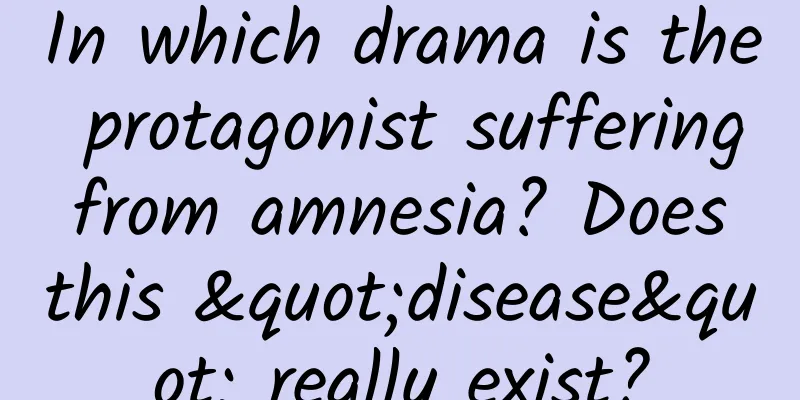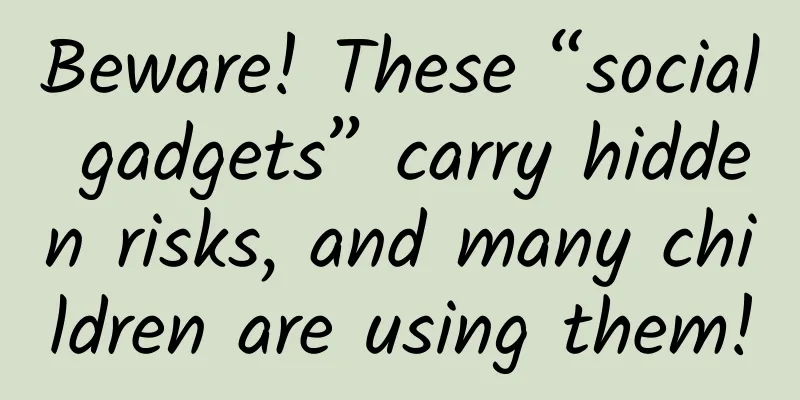In which drama is the protagonist suffering from amnesia? Does this "disease" really exist?

|
Tuchong Creative In many movies, TV shows and literary works, "amnesia" often appears as a highly dramatic plot. However, with the frequent appearance of amnesia plots, people began to wonder whether "amnesia" really exists in real life? Can memory be lost and then miraculously restored like in TV dramas? In this issue of popular science exploration, let us unveil the mystery of amnesia and explore the secrets of memory. 1. How do memories arise and disappear? (1) Memory formation: Based on our current understanding of the mechanism of memory formation, we generally divide the memory formation process into three parts: "encoding", "storage" and "retrieval". It can be simply understood as "remembering" is the process of storage; "recalling" is the part of extracting information; and the process of converting external information from information blocks into memory is called "encoding". ① Encoding (the starting point of memory formation): External information is received through sensory organs, converted into neural signals, and transmitted between synapses to the corresponding areas of the brain for preliminary processing. ② Storage (key stage of memory retention): ① Short-term memory: Information is temporarily retained in the brain, usually no more than 1 minute. ② Long-term memory: Through repetition and reinforcement, short-term memory can be converted into long-term memory. The storage of long-term memory involves synaptic plasticity, that is, the strengthening of connections between neurons. Among them, the process of converting newly learned information into long-term stable memory occurs in the hippocampus, involving gene expression and protein synthesis. ③ Retrieval (the process of using memory): When recall is needed, the brain reactivates the neural network related to the memory for direct retrieval or assisted retrieval through clues or associations. The process of memory formation
We often see such plots in TV dramas, where the protagonist suddenly loses his memory due to various coincidences and can't remember anything about the past. For example, people who drink alcohol will tell us that they drank too much yesterday and had blackouts, that is, they can't remember the events at that time, and it's all blank. The disappearance of these memories is actually the inability of the brain to extract the information that has been memorized, so people can't remember anything they remembered before. Therefore, when external factors affect any link of memory encoding, storage and retrieval, it may cause the memory to disappear. According to different reasons, we can divide the causes of memory loss into different types. ① Natural decline: caused by aging and long-term non-repetition of acquired memories, which we call forgetting. German psychologist Hermann Ebbinghaus conducted a systematic study on the phenomenon of forgetting. He used meaningless syllables as memory materials and plotted the experimental data into a curve, called the Ebbinghaus forgetting curve. The curve shows a law of forgetting development: the forgetting process is uneven, forgetting is fast at the beginning of recognition, and then gradually slows down. After a considerable period of time, it is almost no longer forgotten, that is, the development of forgetting is "fast at first and slow later." ②Interference: namely proactive inhibition and retroactive inhibition, which are important causes of forgetting of short-term and long-term memory. Robert J. Sternberg, a famous cognitive psychologist, believes that competing information is easy to interfere with each other and cause forgetting. ③ Factors such as disease and trauma: such as neurodegenerative diseases (Alzheimer's disease), brain tumors compressing brain tissue related to memory, emotional shock and trauma (concussion caused by car accidents), epileptic seizures, drugs, thiamine (vitamin B1 deficiency, Wernicke-Korsakoff syndrome), etc. 2. Why does amnesia only cause people to forget experiences but not skills? To understand this problem, we must first understand the difference between "amnesia" commonly seen in film and television works and "Alzheimer's disease" that causes loss of daily living skills: The difference between amnesia and Alzheimer's disease The reason why people with amnesia may retain their skills has to do with how memories are stored in the brain and its neural mechanisms. Human memory can be divided into two main types: explicit memory (declarative memory) and implicit memory (non-declarative memory). The difference between explicit memory and implicit memory Skill memory (such as daily self-care skills, riding a bicycle, playing the piano, etc.) is an implicit procedural memory that is related to the areas of the brain that control movement and procedural learning. The formation and storage of these memories do not rely on the hippocampus, so even if some people with amnesia forget personal experiences (impaired explicit memory), they are usually still able to perform the skills they have learned (implicit memory retention). 3. Can lost memories be restored? Memories are stored in multiple areas of the brain, such as the hippocampus and surrounding medial temporal lobe areas, and the memory retrieval process may involve different neural pathways. If the memory storage area and neural pathways are not severely damaged, the lost memories of amnesia patients can theoretically be restored. However, given that the likelihood of memory recovery depends on a variety of factors, including the cause of amnesia, its severity, the patient's age and overall health, the likelihood and effectiveness of memory recovery vary from person to person, and not all lost memories can necessarily be fully restored. Differentiating between different causes of amnesia Depending on the cause of the disease, we can take different approaches to promote memory recovery. Considering the plasticity of memory, we can activate memory engram cells through certain methods such as cognitive training and drug therapy to promote memory recovery: (1) Psychotherapy: For amnesia caused by functional reasons, psychotherapy such as hypnosis therapy and cognitive behavioral therapy can help patients deal with post-traumatic stress and emotional problems and help restore memory. (2) Drug treatment: Depending on the different causes and manifestations, drugs such as methylcobalamin, oxiracetam, donepezil, and gangliosides are commonly used in clinical practice. For some patients with psychogenic amnesia, antidepressants may be used as prescribed by the doctor. (3) Environmental stimulation: In some cases, specific environmental stimulation or prompts can trigger memory retrieval and help patients recover their memories. However, this should be done step by step according to the patient's acceptance level to promote memory recovery. In short, the causes of amnesia in reality are complex, including craniocerebral injury, brain disease, drug effects or psychological trauma, and its symptoms and recovery process vary from person to person, and it is not achieved overnight. Depending on the cause of amnesia, individual differences, and the timeliness and effectiveness of treatment, it is not always as fast and thorough as in some film and television works. The treatment of amnesia requires a combination of medical intervention, psychotherapy, cognitive training and other methods, as well as long-term support from family and society. This article is a work supported by the Science Popularization China Creation Cultivation Program Author: Lu Pengwei, Beijing Tiantan Hospital, Capital Medical University; Shi Mengjia, Capital Medical University Reviewer: Gui Yaxing, Chief Physician, Department of Neurology, Shanghai First People's Hospital, Shanghai Jiao Tong University Produced by: China Association for Science and Technology Department of Science Popularization Producer: China Science and Technology Press Co., Ltd., Beijing Zhongke Xinghe Culture Media Co., Ltd. |
<<: Should you keep your chopsticks separate? Just look at the bacteria content on your chopsticks!
Recommend
From Darwin, Mendel to Watson, why do these great scientists want to know the genetic secrets of life?
Introduction Throughout history, there have been ...
Android WeChat 7.0.18 released: taps can be withdrawn, and comments in Moments can be deleted
WeChat has just released the latest official vers...
Build a "Digital Great Wall" for the thousands of miles of border and coastal defense
Each "informationized sentinel" can det...
Android 6.1 first revealed: two major features are coming!
Previously, Google executives revealed that they ...
Why do batteries become as “afraid of the cold” as you are in winter?
Produced by: Science Popularization China Author:...
Let’s talk about the search for quick delivery in information flow ads
01 What is Search Quickcast? Search quick deliver...
Momo’s paying users have surged. What’s the operational growth logic behind it?
When it comes to Momo, many people still think of...
Operational strategies for community operations!
The article reviews the development of a check-in...
This water conservancy project is known as one of the "Three Major Projects of Ancient China" along with the Great Wall and the Grand Canal. Did you know?
Karez With the Great Wall and the Grand Canal Als...
Essential for overseas promotion: What are the global advertising channels?
AppsFlyer breaks down data by industry verticals ...
Example sharing: Innovative growth strategies of 12 top teams including Facebook, Airbnb, etc.
The original article lists 21 innovative growth e...
Ecological beauty adds green to the world's largest clean energy corridor
At the turn of spring and summer, the world's...
China Passenger Car Association: China's global auto market share will rise to 41% in December 2024, a record high
According to recent news, the latest data release...
Pay attention to prevention! The "ghost" Norovirus is prevalent in winter. Please click here for the protection guide →
Norovirus is the main pathogen that causes acute ...









